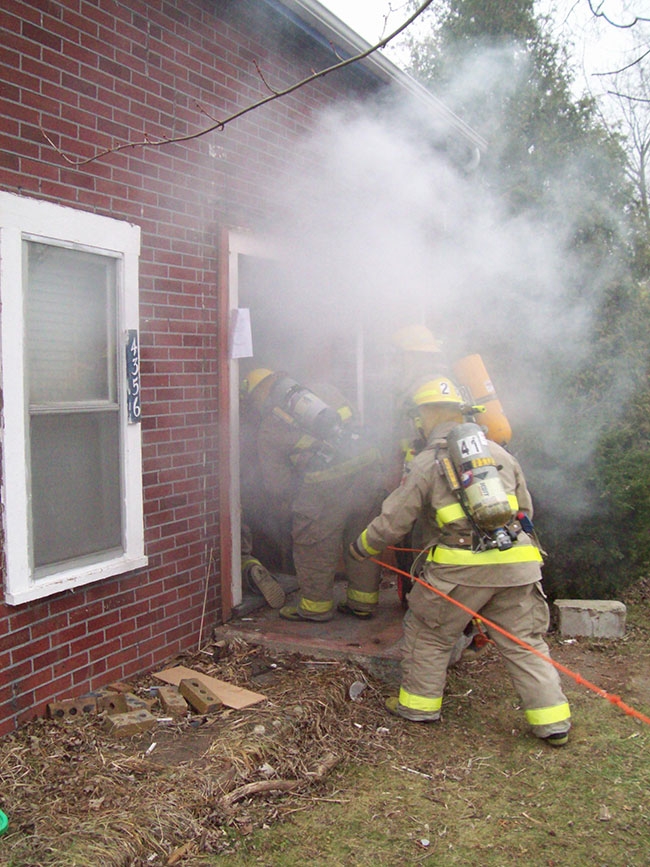
Back to Basics: July 2018
Mark Van
Features Fire Ground TrainingWhenever a mayday is called, it is for an emergency that requires help. The hope of the caller is that when the message is received by another person, help will be sent or given. In the fire service we use this term as a way for the firefighter to call for help.
 By having the PASS alarm activated Whenever a mayday is called
By having the PASS alarm activated Whenever a mayday is calledIn recent columns, we’ve been focusing our attention on the communication aspect of firefighter survival and the mayday call. In our last column, we detailed the need for communication in this process. Now we are going to focus on how we should be calling for a mayday.
When a firefighter realizes that they are in need of help, they need to alert Command. The Incident Commander (IC) is going to be the one person who will be able to send help right away when the call comes in. Alert the IC without delay!
There is a tendency for people to self-doubt when they are in trouble or make themselves believe that they can get out of trouble without notifying anybody. This can create a delay in calling for a mayday which delays the help that could be coming in the way of the RIT team or another crew that may be nearby. Once the IC has received the call for help, they can put into motion the sequence of events that will help the one or two firefighters who are in trouble.
When a mayday call is made, it needs to be repeated three times so that the IC and others who may be listening to the radio will hear it: “mayday, mayday, mayday.” Once that call has been made, the firefighter needs to wait for the IC to acknowledge it before giving more information. There is a good chance that the mayday call may go unheard and that firefighter has just wasted a few breaths giving lots of information before being acknowledged.
Once the IC has responded to the mayday, the firefighter will need to give critical information such as who they are, what’s the problem and what they need. There is the L.U.N.A.R. acronym (Location, Unit, Name, Assignment and Resources) that is taught in many textbooks, but how many people when faced with life and death will remember all the L.U.N.A.R. points? It is too much information to give and recall.
Once the IC has established a communication link, more information can be requested such as what was their assignment, what was their last known location, what can they see around them, what is the status of their air supply, are they by themselves, are they hurt, do they need medical attention, etc. The initial call for help is designed to be a short call with limited information so that help is dispatched and then more information can be gathered.
Why would the IC ask about their assignment? By asking this question, the IC and the RIT team can ascertain where the downed firefighter may be located. If they were assigned to do a primary search of the first floor, then this will be a good place to start. If they were assigned to ventilate the roof, then the location that they were on the roof may indicate where they may be inside the structure. Along with this question, the IC needs to be concerned with the status of the other crew members. We know that we do not work by ourselves, so if one firefighter has called a mayday, there is a good chance that the other firefighter assigned to the team is also requiring help as well.
Once the mayday call has been made and acknowledged by the IC, the downed firefighter needs to activate their PASS alarm. The PASS alarm gets activated after the mayday call because it will allow for good communication. If the PASS alarm is going off in the background while trying to call for a mayday, it will hinder communications. Sometimes this may be the case because the firefighter cannot deactivate the PASS alarm while trying to call for help, but if it can be silenced until afterwards, it will help.
By having the PASS alarm activated, it will alert the RIT team to where the firefighter is located, and it will also alert others on the fire ground. This is the main reason why false activations need to be eliminated. If we hear a PASS alarm, we need to be reactive to it and not complacent. We become complacent because we are used to hearing them go off all the time.
This elimination of false activations begins in training and needs to be enforced from all parties. If we train the way we play then we will react the same way all the time regardless of a training environment or the real environment. Enforcement can vary depending upon who you are dealing with: recruit firefighters can do push-ups or burpees with the SCBA on compared to veteran firefighters who may be tasked with making dinner for the crew.
Many firefighters have perished because they did not call for help and their PASS alarm was not activated. This is what led to the NFPA mandating redundant PASS alarms. They are there to save our lives and need to be treated that way, not just another car alarm going off but rather a life calling for help.
Mark van der Feyst has been in the fire service since 1999 and is a full-time firefighter with the Woodstock Fire Department, Ont.. Mark has instructed in Canada, the United States, FDIC and India. Mark@FireStarTraining.com
Print this page